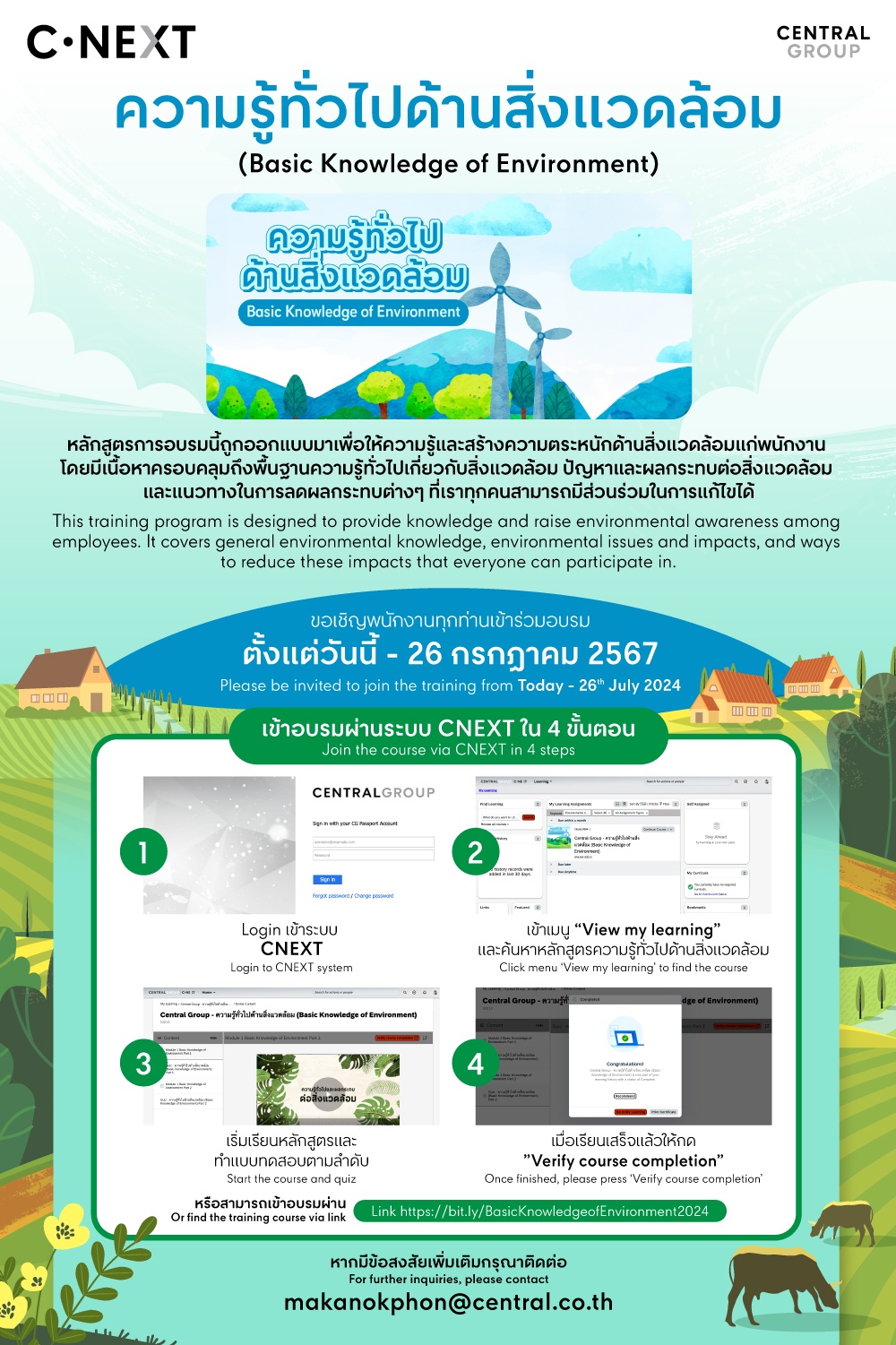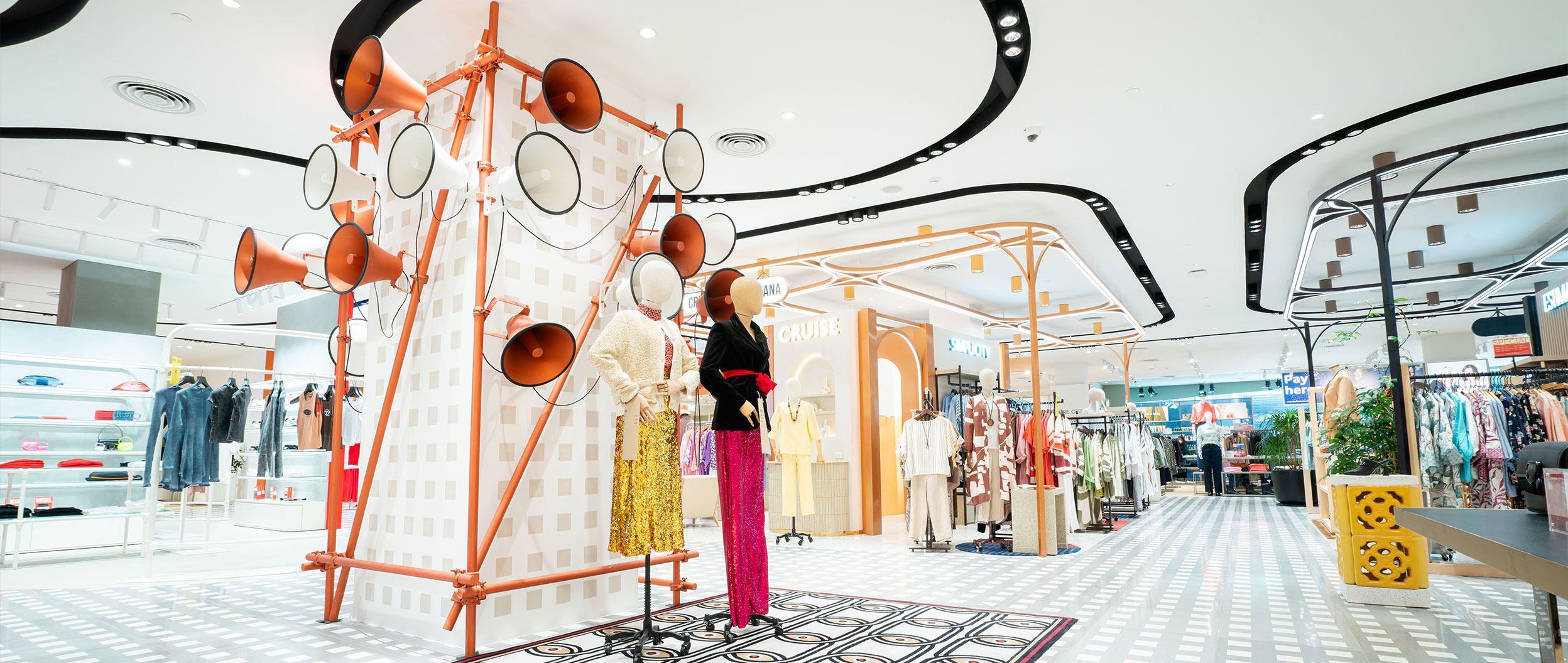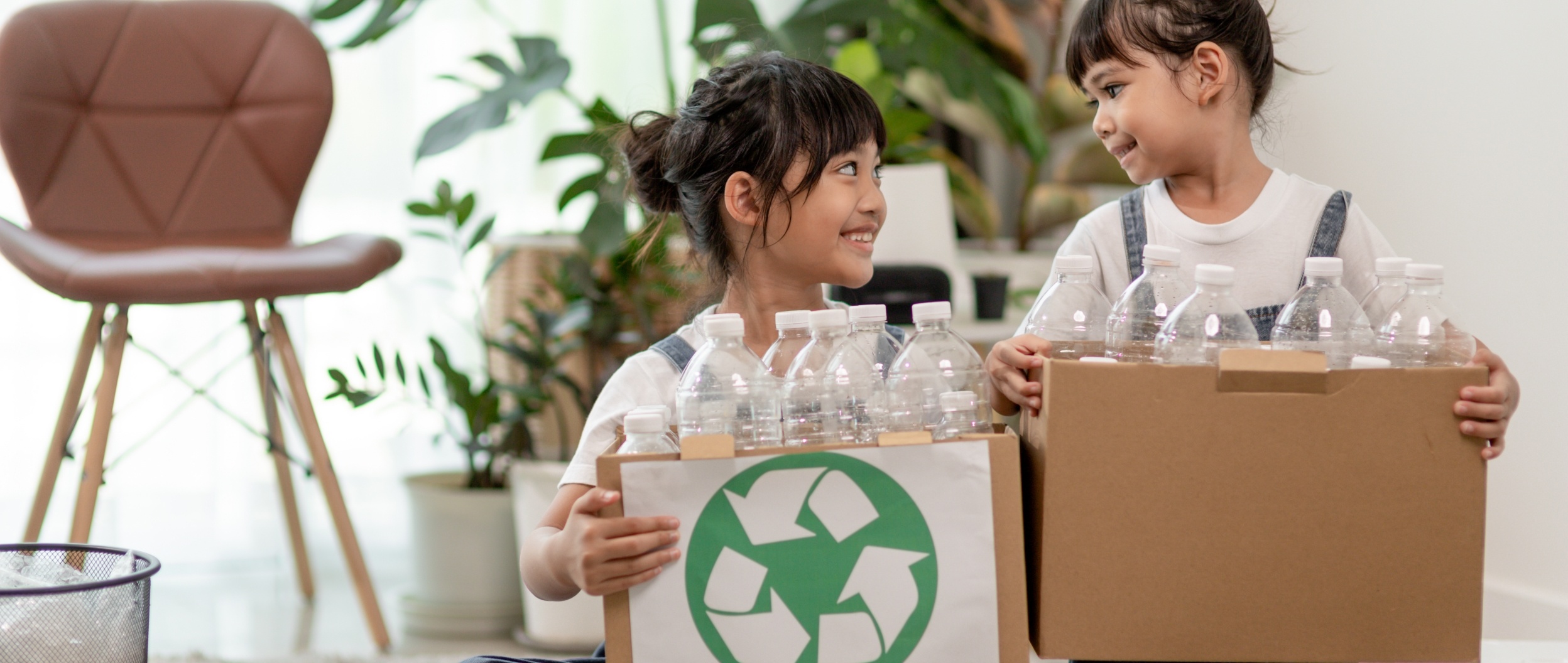Resource Efficiency
Challenges and Opportunities
Resource scarcity and degradation directly impact the business operations and stakeholders, as they may lead to disruptions in the supply chain due to inconsistent availability and lower quality of raw materials. These issues can affect the production processes of suppliers, employee operations, delays in customer deliveries, and potentially result in a decrease in product quality. Furthermore, improper resource management can negatively impact the surrounding communities, such as through the release of pollutants and waste that affect their quality of life. Compliance with environmental regulations and standards can reduce risks from community complaints and legal actions, while building trust and confidence among stakeholders.
Effective resource management enhances Central Retail's competitive edge by reducing operational costs and optimizing resource utilization, such as through technology that reduces energy and water consumption, the use of recyclable packaging, and efficient waste recycling. Additionally, developing environmentally friendly products addresses the growing demand from consumers focused on sustainability, while fostering innovation in production processes to increase product value. This also establishes new business opportunities through investments in clean technologies and green innovations, enabling Central Retail to access new funding sources and create business partnerships, driving sustainable growth.
Central Retail recognizes the importance of resource efficiency and has set strategic goals aligned with sustainable development principles. These include reducing electricity consumption per unit of revenue by 30%, achieving 100% environmentally friendly packaging, and diverting waste to landfills by 30% of total waste by 2030. These initiatives reflect Central Retail commitment to improving resource efficiency, minimizing environmental impact, and creating shared values for the society.
Management Approach
Central Retail has established comprehensive environmental policies and practices covering resource management, including the Environmental Policy, the Plastic & Packaging Reduction Guidelines, and the Food Loss & Waste Reduction Guidelines. These policies serve as guidelines for employees and stakeholders across all business units to ensure effective and consistent environmental management. In addition, Central Retail has developed practices in alignment with international standards. Notably, OfficeMate Logistics, a subsidiary of Central Retail has obtained ISO 14001:2015 certification, an international standard for environmental management systems.
Additionally, Central Retail has introduced the ReNEW strategy, an environmental action plan aimed at achieving net-zero greenhouse gas emissions by 2050. This strategy is based on circular economy principles and systematic resource management, encompassing energy, water, packaging, and waste management, as well as food loss and waste reduction throughout the value chain. Central Retail also prioritizes raising environmental awareness among employees and stakeholders through training programs focused on resource management, climate change, and responsible sourcing. Furthermore, it fosters collaboration among employees, partners, and customers to drive collective action and create long-term positive environmental impacts.
Energy Management
Central Retail recognizes the importance of energy efficiency management in ensuring sustainable business operations. Therefore, it has established an energy management plan to reduce energy consumption, improve operational efficiency, and minimize environmental impact. To achieve these goals, Central Retail has implemented a comprehensive energy management strategy, beginning with energy audits in retail stores and warehouses to assess energy usage patterns and identify opportunities for reducing unnecessary energy consumption. In 2024 the Company has conducted energy audits for 26 stores under Central department store and Robinson department store. The audits identified Central department store Rama 3 as having the highest energy consumption, primarily attributed to Chiller systems and well operating the indoor air conditioning. Alongside these audits, Central Retail has undertaken infrastructure improvements, such as chiller systems, well operating the indoor air conditioning and installing smart energy management systems resulting in reduction of 2.90 MWh of energy consumption. Additionally, measures have been developed to reduce energy use within operational processes. Central Retail also promotes employee participation in energy conservation by encouraging changes in energy usage behavior. Energy-saving initiatives are regularly monitored and evaluated to ensure measurable results, analyze energy consumption data, and adjust strategies and action plans to enhance efficiency. Moreover, Central Retail ensures compliance with international standards, as demonstrated by the Central Marketing Group’s warehouse, which has achieved ISO 50001:2018 certification. This certification promotes continuous improvement in energy performance, contributing to cost reduction, greenhouse gas emissions reduction, and minimization of environmental impacts.
Beyond energy reduction measures, Central Retail is committed to the use of clean and renewable energy, such as solar power, by installing solar panels in its facilities and increasing the proportion of renewable energy in its operations. Moreover, investments in innovation and technology to increase energy efficiency for Central Retail in the long-term. This includes the adoption of advanced automation systems and explore energy-efficient building materials to further reduce energy usage. Meanwhile, Central Retail emphasizes the importance of employee awareness by providing energy efficiency trainings to ensure that staff members adopt best practices for energy conservation in daily activities. By fostering a corporate culture that prioritizes energy conservation and sustainability, Continously, Central Retail remains committed to developing new initiatives that enhance energy efficiency that align with international sustainable development standards.
Water Management
Efficient water resource management is a crucial factor in ensuring sustainable business operations. Central Retail is committed to reducing water consumption, improving wastewater quality, and promoting water recycling to maintain long-term water resource sustainability. Central Retail has implemented comprehensive water management measures by identifying areas facing water scarcity, and developing appropriate measures to optimize water use. In 2024, the Company continued its water consumption assessments at 3 priority locations being Robinson Lifestyle department stores in Surin, Sakon Nakorn, and Phetchaburi provinces. In response, new water efficiency initiatives such as water reuse plants that treat wastewater from toilet flushing system were introduced. The Company plans to expand its water consumption assessments to additional priority stores in the future to further enhance water efficiency. Additionally, Central Retail has undertaken actions to reduce water consumption, such as installing water-efficient fixtures like automatic faucets and high-efficiency sanitation systems, optimizing cleaning and maintenance processes to minimize water usage, and promoting employee awareness to encourage responsible water use in daily operations.
Beyond water conservation efforts, Central Retail also focuses on actions to improve wastewater quality by installing high-efficiency wastewater treatment systems to ensure that discharged water meets the environmental standards and by reducing the use of chemicals that could negatively impact water sources. In 2024, the Company continues to regularly inspect the chemical and physical properties of wastewater from treatment facilities at department stores directly operated under Robinson Lifestyle, ensuring that all parameters remain within acceptable levels in accordance with local regulations. Nevertheless, in the case of inspection results showing wastewater quality going beyond acceptable levels, the Company will develop monitoring plan and enact improvements as necessary until the wastewater quality becomes satisfactory. Moreover, Central Retail has implemented water recycling initiatives by reusing treated water in operational processes, such as cooling systems and landscape irrigation, to reduce Central Retail’s dependency on natural water sources. To further strengthen these efforts, Central Retail provides awareness training to employees on water efficiency management programs, ensuring that all staff members understand and adopt best practices for sustainable water use.
Packaging Management
Central Retail recognizes the importance of sustainable packaging management by transitioning to environmentally-responsible business operations. It is committed to reducing the packaging wastes, increasing the use of reusable and recyclable packagings, and promoting innovative alternatives to minimize environmental impact. The following packaging management measures have been implemented:
-
Phase-Out of Single-Use Plastic Packaging
"Say No to Plastic Bags" initiative to eliminate single-use plastic packaging. This program promotes the adoption of environmentally friendly alternatives and establishes policies to reduce and phase out plastic bags and single-use plastic packaging.
-
Increase the Use of Reusable Packaging
"Bring Your Own Bag" campaign, Central Retail encourages customers and employees to use reusable packaging, such as fabric bags and refillable containers. This initiative aims to reduce packaging waste and avoid single-use materials.
-
Increase the use of recycled-material and recyclable packaging
"Bag for Life" program supports the adoption of packaging that can be reused multiple times and recyclable, including packaging made from recycled materials. These bags are designed with increased thickness for durability, enabling multiple uses. Once worn or damaged, they can be recycled and reproduced into new bags made from recycled materials. This initiative reduces the environmental impact of packaging waste.
-
Packaging Waste Collection for Recycling and Upcycling
Collaboration with external organizations to develop recycling programs and upcycled products that transform used packaging into new products or materials. These efforts enhance the efficiency of the recycling process and promoting a sustainable circular economy.
-
Research and Development in Sustainable Packaging Solutions
Allocate resources to develop innovative sustainable packaging solutions. These efforts focus on creating biodegradable materials, improving the properties of recycled materials, and designing packaging with less materials while maintaining strength and performance.
In 2024, both “Bring Your Own Bag” together with “Say No to Plastic Bags” campaigns had been able to reduce the use of single-use bags and helped avoid 10,247,345 plastic bags or 153.7 tons of packaging waste.
Waste and Food Waste Management
Central Retail implements systematic waste and food waste management to reduce waste generation, improve waste handling processes, and maximize recycling and reuse. Various comprehensive measures have been implemented, including waste audits to identify opportunities for improving waste performance. The waste audits are conducted via online interview, on-site surveys, and questionnaires covering all business units to determine waste sources and analyze potential reduction strategies. Through the waste audits, the Company has identifies operations under the Food Business Category to generate the highest quantities of waste in 2024. To achieve waste minimization, Central Retail has developed action plans to reduce waste generation by optimizing production processes, using raw materials efficiently, and minimizing unnecessary materials. Additionally, Central Retail emphasizes waste reduction training provided to employees and stakeholders by organizing awareness programs. Employees are encouraged to participate in waste reduction at every stage of operations. Waste sorting stations have also been established in the offices, shopping centers, and department stores to promote waste segregation from the source among employees and customers.
Central Retail has invested in innovation and the research and development, adopting advanced technologies for efficient waste reduction and management. Central Retail has developed an application for waste data collection to identify waste sources, measure waste volume, and manage waste effectively. This application facilitates efficient data collection and waste management. This digital tool enables the integration of recycling programs to reduce the waste sent to landfill by facilitating better waste sorting and repurposing efforts. Furthermore, Central Retail actively promotes a circular economy approach in waste management. For example, wooden pallets used in distribution centers are returned to suppliers for reuse, cardboard boxes are reused until they deteriorate and are then recycled, and plastic film is collected for recycling. Central Retail also collaborates with external partners on research and development of alternative biodegradable packaging for food products, ensuring compromise food preservation quality.
Aside from managing waste from internal operations, Central Retail also addresses food loss and waste from surplus products, which account for a significant proportion of total waste. To tackle this issue, Central Retail has implemented programs to measure food loss and waste, systematically tracking and categorizing food waste by type, including bakery, Ready-to-Eat meals, fresh meat, fresh packaged food, seafood, fruits and vegetables, and snacks. This breakdown of food loss and waste volumes by food category enables Central Retail to develop effective waste reduction strategies and targets. To reduce the total volume of food loss and waste, Central Retail has invested in artificial intelligence (AI) technology to identify near-expiry products, apply dynamic pricing strategies, and determine the most appropriate handling methods for each product. This innovation improves inventory management and supply planning, helping to minimize waste at the source. To further prevent food waste, Central Retail collaborates with platforms such as Yindii, offering surplus food at discounted prices and selling "Surprise Bags" containing edible but near-expiry food at Tops Supermarket and Tops Daily. Additionally, Central Retail partners with external organizations such as SOS Thailand, VV Share Foundation, The Mirror Foundation, and CAS to donate surplus food in good condition to vulnerable communities. Central Retail also engages in programs aimed at using food loss and waste for alternative uses, working with JAIKLA to recycle surplus food into insect-based animal feed.
Project Highlights
Energy Reduction and Efficiency Improvement
Central Retail has implemented modern technology and automated systems in buildings and infrastructure to reduce energy consumption without compromising service quality by installing LED lighting, covering 90% of our business areas, to help lower overall energy use. In addition, Central Retail have installed upto 2,163 energy-efficient refrigerators that use environmentally friendly refrigerants across 246 locations. These include Central Food Retail and GO! Wholesale business units. As a result, Central Retail have reduced energy consumption by over 17,485 megawatt-hours or 62,946.07 GJ, which helps reduce greenhouse gas emissions by approximately 8,741 Tons of CO2 equivalent.
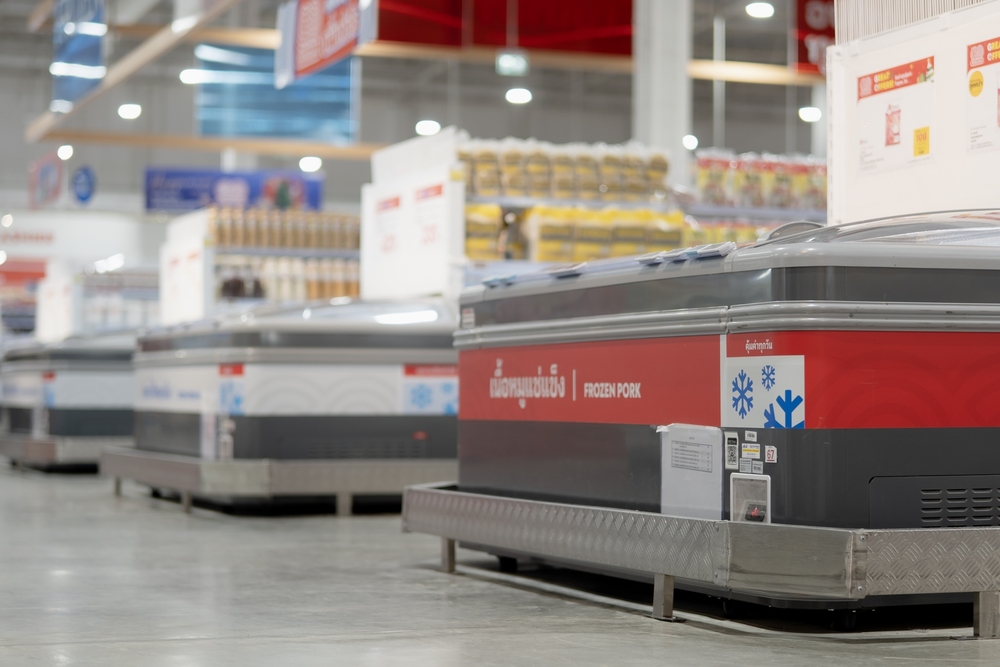
Water Efficiency and Reuse Initiatives
Robinson Lifestyle, part of the Property Business Group, have assessed water usage patterns to implement measures aimed at reducing water consumption and enhancing water efficiency. These measures include optimizing the water flow rate of sanitary fixtures, installing rainwater storage tanks for water reserves, recycling water from cooling towers and air conditioning systems, and utilizing treated water for landscape irrigation. Additionally, treated wastewater is reused in toilet flushing systems to maximize water efficiency. The stores regularly monitor wastewater quality to ensure compliance with standards. In 2024, these initiatives reduced water consumption by 3,200 liters per month per store, resulting in a cost saving of over 5.6 million baht annually.
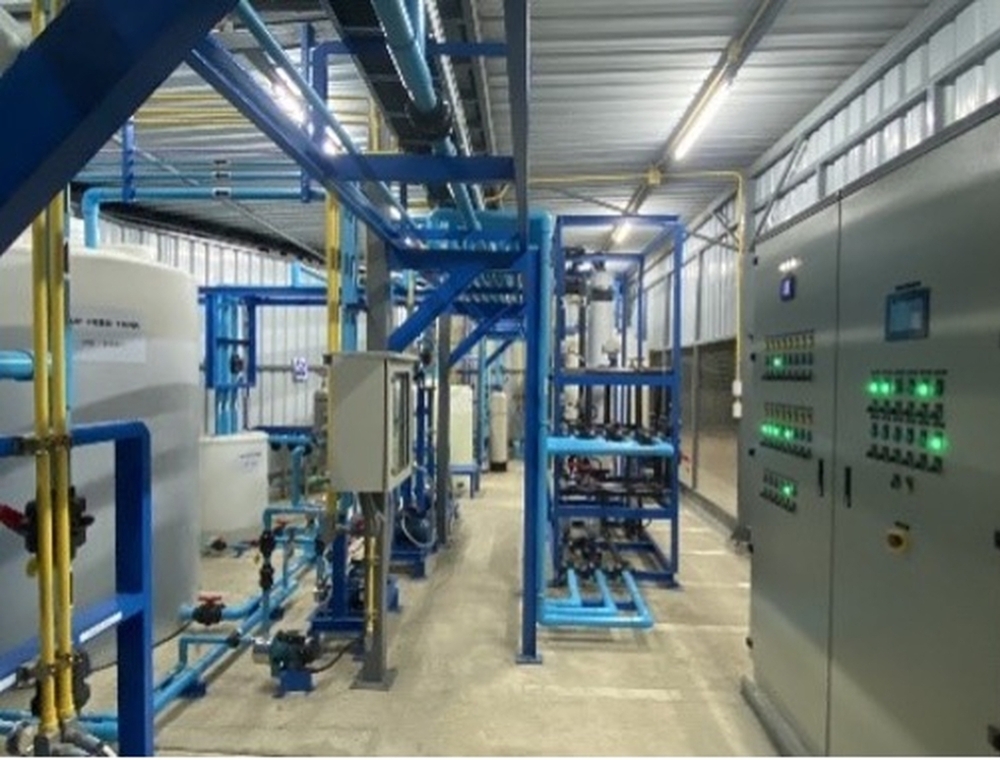
Packaging Management
Central Retail has developed and adopted various alternative materials to optimize packaging management. The Thai Watsadu Distribution Center, part of the Hardline Business Group, has collaborated with Istrade Co., Ltd. to develop reusable mesh covers for product protection and Extra Roll Cages to reduce the use of single-use pallet stretch film and pallets. This initiative has successfully reduced the use of stretch film by 10.54 tons and halved the transportation space required, saving transportation costs by 20.4 million baht per year. In addition, the Central Marketing Group distribution center, part of the Fashion Business Group, has replaced plastic bubble wrap with perforated paper for product wrapping. This change has decreased the use of plastic packaging by 600 kilograms, contributing to the reduction of single-use plastics and promoting the use of environmentally friendly packaging. These projects demonstrate Central Retail commitment to developing innovations that reduce plastic usage and support sustainable packaging management.
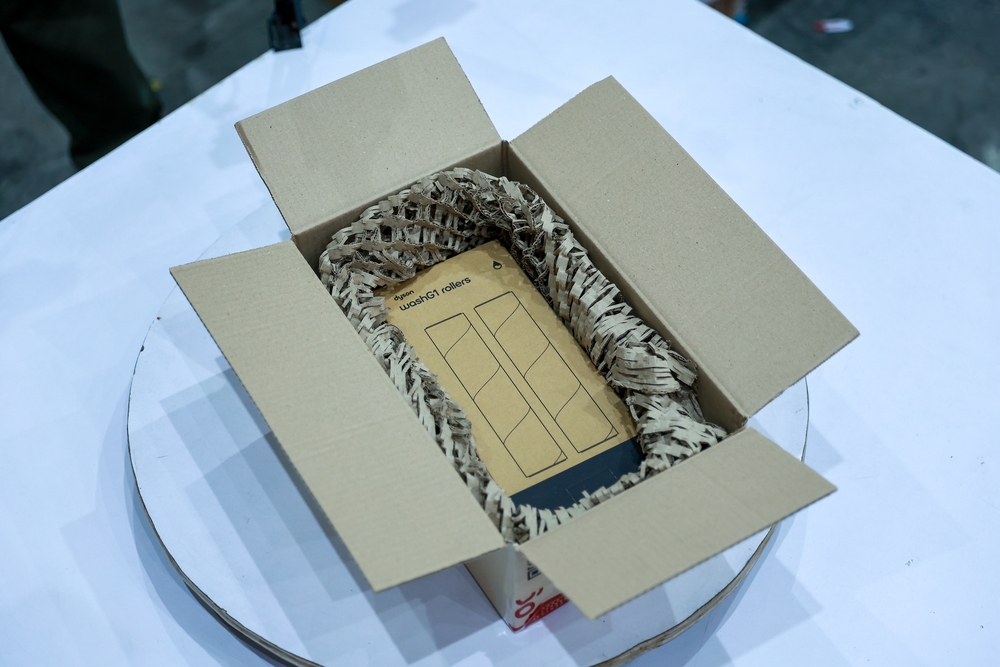
Waste Management and Circular Economy
Central Retail actively promotes waste management awareness and engagement among employees and customers. As part of this effort, plastic bottle collection machines have been installed in shopping malls and Tops Supermarkets in Thailand, as well as plastic waste collection machines in GO! Supermarkets in Vietnam. Customers and employees can deposit plastic bottles to collect points that can be redeemed for rewards, donated to charity, or used to support community initiatives. Through these activities, over 9.85 tons of plastic waste have been collected and efficiently utilized. The collected plastic wastes have been recycled and upcycled into 10,859 monk robes. Additionally, plastic bottle caps have been collected and upcycled into educational tools, including bookshelves and study tables, which have been donated to schools.
Supersports, part of Central Retail, has launched the "Get Donate, Make Your Move" project, aimed at promoting equal access to sports opportunities for youth. This initiative collects gently used sports shoes from customers nationwide and donates them to the Department of Children and Youth for distribution to shelters across the country. In 2024, the project collected 3,225 pairs of shoes, reducing waste by 3.72 tons. Additionally, Central Marketing Group, the official distributor of Hush Puppies footwear, collaborated with the Pankan Shop in the “Hush Puppies and Pankan Present a Chance for Change: Donate in the Kindness Box” project. This initiative encourages the donation of gently used shoes to the Yuvabadhana Foundation, successfully collecting 191 pairs of shoes and reducing waste by 171 kilograms.
Power Buy, part of Central Retail, has implemented a comprehensive e-waste management program. Customers are encouraged to bring in old electrical appliances to exchange for discounts, promoting the proper collection and disposal of electronic waste. Appliances that are still in good condition are donated to vocational schools, including Phra Dabos School, Bangsaen Technical College, and Uthai Thani Technical College, to support skill development and learning. Functional appliances are also distributed to schools and remote communities for further use. Non-functional appliances are disassembled and recycled according to international standards. In 2024, the program successfully collected and managed over 600 tons of electronic waste items, reducing waste by 24.4 tons and contributing to a decrease in greenhouse gas emissions by up to 8,741 tons of CO2 equivalent.
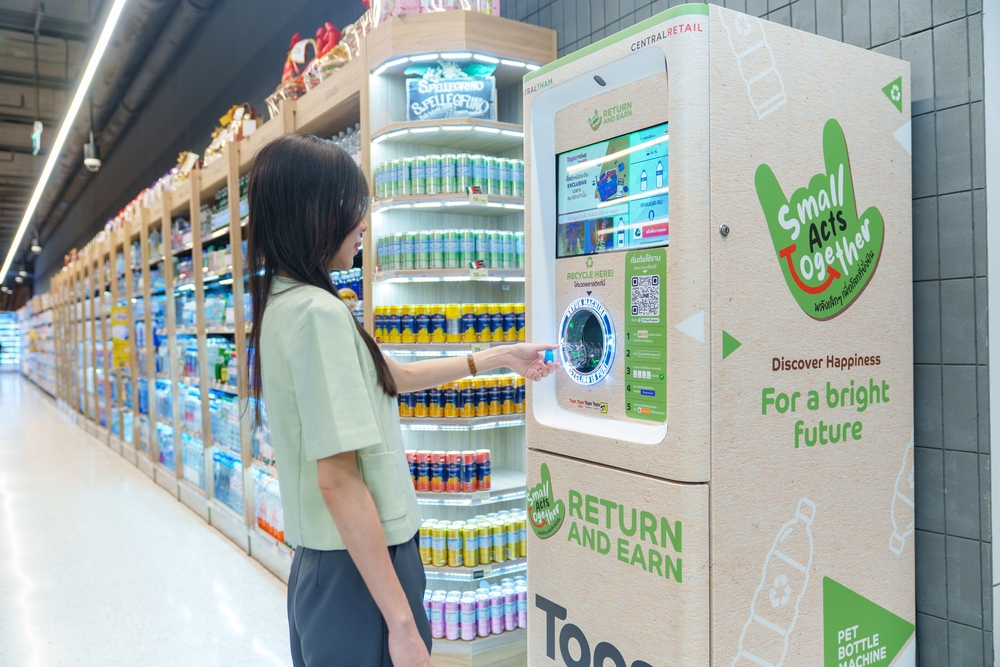
Food Loss and Waste Reduction
Tops Supermarket, under Central Food Retail, has launched the “Food Hero, Taste not Waste” campaign to encourage consumers to rethink their perception of purchasing near-expiry products that remain in good quality. The campaign offers a 30-50% discount on various food items and ingredients, such as bakery products, beverages, dairy products, fruits and vegetables, meat, ready-to-eat meals, and snacks. These products are displayed in a designated discount zone to provide transparent information to consumers. Additionally, the “Smart Way” pilot project has been introduced, utilizing an AI-powered system to track products nearing their expiration date. This system enhances accuracy and efficiency in inventory management and order planning. These initiatives have successfully reduced food waste at the source by over 1,465,499 items while optimizing cost management related to surplus food.
Furthermore, Central Retail has delivered quality surplus food to underserved communities and vulnerable groups through collaboration with various organizations, including the Scholars of Sustenance Foundation (SOS), the Union of Superiors General of Thailand under the "Care and Share Food for All" project, the VV Share Foundation, the Mirror Foundation, and the Safe Haven Orphanage. In 2024, the project covered 9 provinces and 61 branches, delivering over 1.57 million kilograms of food or equivalent to 6.6 million meals to 3,000 communities, reducing greenhouse gas emissions by 3,983 tons of CO₂ equivalent emissions. In addition, Central Retail has partnered with the startup “Jaikla” to reduce food waste and optimize resource use through the circular economy concept. Surplus food is processed into pet snacks, sold at Tops Supermarket and online, with total sales reaching 303 bags, helping to reduce food waste by 2,791 kilograms.
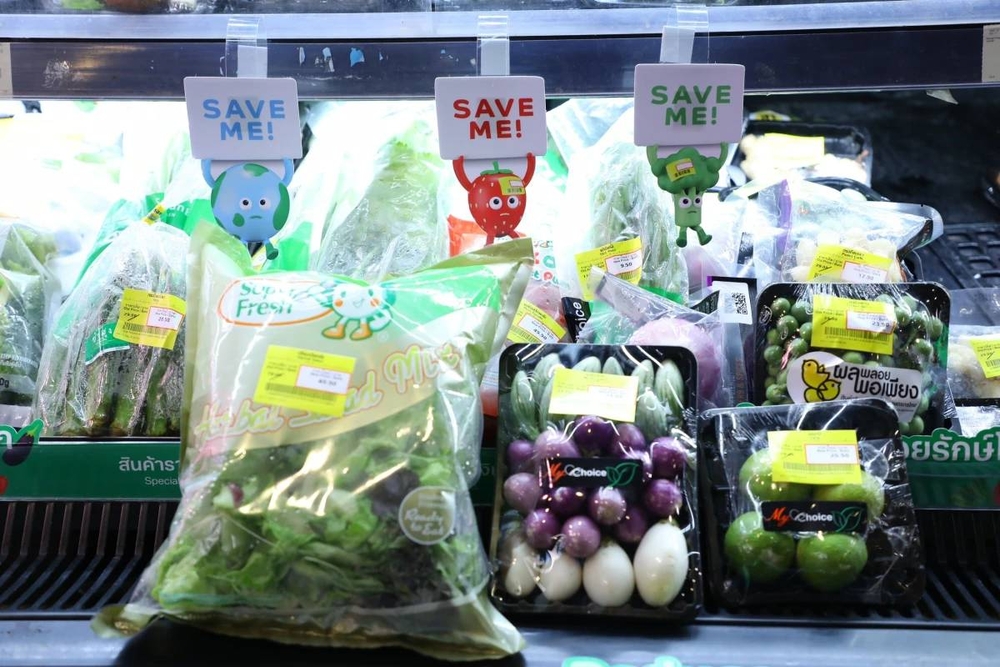
Training on Waste Segregation and Management
Central Retail continuously conducts training sessions and fosters participation in waste management among employees and relevant stakeholders. The training content covers waste overview and issues, waste reduction methods, proper waste segregation techniques, efficient end-of-life waste management, and recording waste data using Central's dedicated application. Additionally, Central has developed a waste management manual to provide practical guidelines for employees to apply both in their work and daily lives. In 2024, training sessions were conducted for employees and stakeholders, including operational staffs, human resources, cleaning staffs, and tenants, covering all business units within Central Retail.
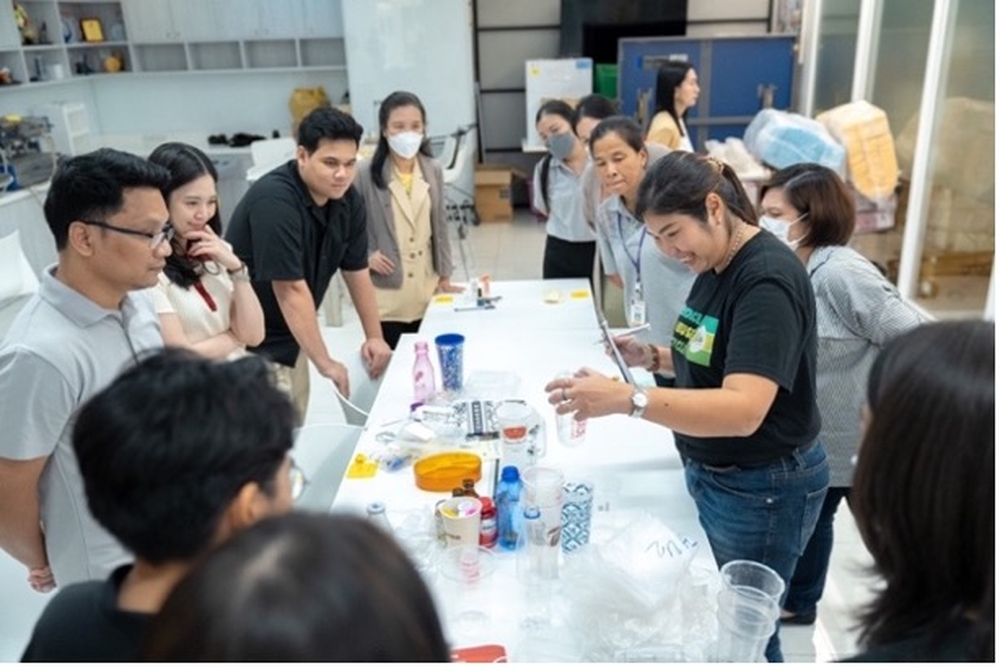
Environmental Awareness Training Program
The Company places significant importance on cultivating a strong environmental consciousness among all employee and stakeholder groups. The Company recognizes that a proper understanding of environmental issues is a fundamental cornerstone for sustainable development. To support this objective, the Company has developed the “Basic Knowledge of Environment” training course. This program is designed to provide foundational knowledge about the environment, current environmental problem scenarios, and approaches to reduce environmental impact, tailored to the roles and responsibilities of each participant group.
This course focuses on enabling participants to learn about and recognize pressing global environmental issues such as global warming, air and water pollution, and the unsustainable use of natural resources. It also covers practical actions that individuals can take to help mitigate these impacts appropriately. In 2024, the Company conducted this training course via the online CNEXT system, with over 12,888 employees and stakeholders from various business units and departments across the Company participating. This demonstrates the awareness and strong engagement of personnel within the organization.
Furthermore, the Company has plans to continuously expand the development of environmental training courses to enhance knowledge comprehensiveness. The courses currently under development include Waste Management, Climate Change, Resource Efficiency, and Responsible Sourcing. These courses will help equip employees with in-depth knowledge and understanding, enabling them to apply it in their work practices and conduct business responsibly towards society and the environment in a sustainable manner.
